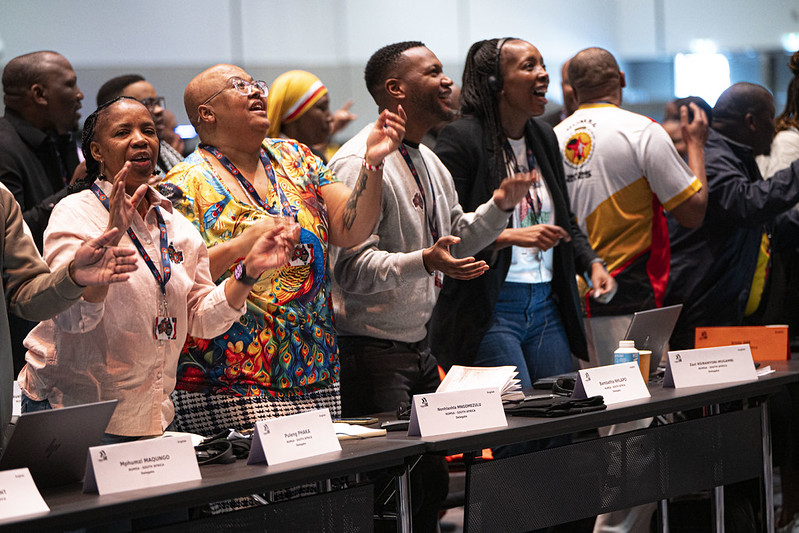Read this article in:
English
- Español
17 November, 2025For Sub Saharan African (SSA) unions, organizing for a just future IndustriALL 4th Congress theme, Sydney, Australia, 4-7 November, provided a timely opportunity to reflect on building union power and how to influence national industrial policies amid rapid changes caused by climate disruptions and digital transformation.
The unions said the theme prompted them to envision several mobilisation campaigns to defend workers’ and trade union rights, foster job creation and security, demand living wages, create green jobs, uphold fair trade, advance sustainable industrial policies, and champion industrialisation. They said campaigns must prioritise equity, reskilling, and local beneficiation while embedding gender equality as one of the cornerstones.
The Congress was held at a moment when SSA is confronting a pivotal crossroads with surging global demand for critical minerals — copper, cobalt, lithium, nickel, and rare earths — vital for electric vehicles and renewable energy technologies. The unions argued that channelling these riches into domestic industrialisation via beneficiation unlocks job creation potential and economic vitality while enforcing human rights due diligence.
Renewable energy production will also create green jobs. Unions said there should be emphasis on upskilling and reskilling of affected coal mineworkers in the case of thermal power station closures in South Africa and other countries.
SSA’s youth bulge, 78 per cent of the population under 35, per UN and World Bank data, holds potential as a demographic dividend. But high unemployment, trapping youth in precarious informal work, could squander it entirely. Unions thus support formalisation which will legitimise artisanal and small-scale mining in the Democratic Republic of Congo, Zambia, and Zimbabwe, alongside Kenya’s roadside auto artisans and Nigeria’s tailoring shops, to transform informal work into equitable, rights-secured formal economies.
While digital transformation will disrupt industries through automation and artificial intelligence, it will also benefit unions as they adopt digital tools of organizing and mapping industry supply chains. Meanwhile, intra-African trade which is promoted by the African Continental Free Trade Area (AfCFTA) emerges as a potential alternative for textiles and garments, reeling from US tariffs that have imploded factories and loom over Lesotho with 40,000 job losses. The non-renewal of the US African Growth and Opportunity Act has dire consequences for industries in Kenya. Regional trade and African industrialization could stitch back resilience and livelihoods, argued the unions. The unions’ arguments resonate with the theme for the African Industrialization Week (AIW2025) which is:
“Transforming Africa’s economy through sustainable industrialization, regional integration, and innovation.”
In Nigeria, unions are demanding living wages and respect for trade union rights from employers and the federal government. They continue to confront Dangote Industries over union busting.
Mpho Phakedi, National Union of Mineworkers general secretary said:
“Trade unions must push for industrial policies that promote beneficiation and localization instead of raw material exports, job losses, and employment. Global solidarity and campaigns against multinational corporations like Rio Tinto, Glencore and Sibanye, are important to unions’ fighting back and protecting workers’ rights.”
“For textile and garment workers, adapting our industries will require us to deal with new technologies which can improve industrial sustainability and competitiveness,”
said Bonita Loubser, Southern African Clothing and Textile Workers Union (SACTWU) general secretary. She urged technological adoption that empowers women through equal training and leadership development.
Prince William Akporeha, Nigeria Union of Petroleum and Natural Gas workers (NUPENG) president, said a just future is built upon defending workers’ rights:
“We continue to fight for workers’ rights in Nigeria through social dialogue and legal action where necessary.”
“We hail Congress’s bold resolutions on youth, feminism, and trade as they address SSA’s core struggles. We are a continent of young workers and must address their concerns and interests. Feminism supercharges ILO Convention 190 to end violence and harassment in the world of work while fair trade ignites our region’s growth imperative,”
said Rose Omamo, IndustriALL vice president.
